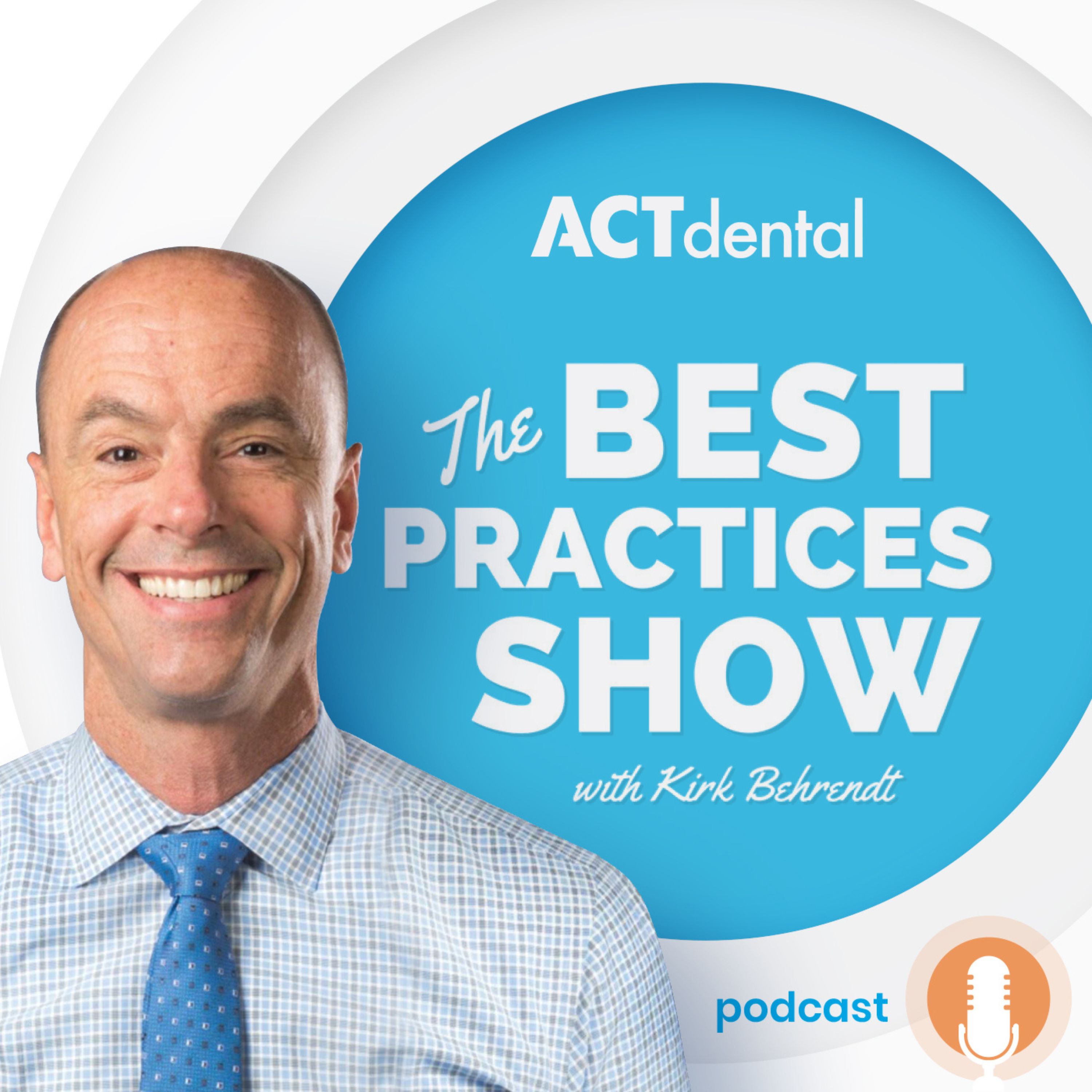Episode 337
337: Critical Steps to Fun & Predictable Dentistry - Dr. Glenn DuPont
Critical Steps to Fun & Predictable Dentistry
Episode #337 with Dr. Glenn DuPont
Dentistry should be a fun, profitable, and predictable career. But for many young professionals coming out of dental school, this isn’t the case, and their practice can become overwhelming and stressful. Kirk Behrendt is joined by Dr. Glenn DuPont to talk about the critical steps to ensure that your patients love you and the work you do, while maintaining a strong business. To learn the best practices you should take to grow a practice that is predictable and profitable, listen to Episode 337 of The Best Practices Show!
Main Takeaways:
Spend time early on with a patient making a diagnosis and treatment plan.
Rethink your approach to solving a case.
Unpredictable things happening in your practice should be rare.
The goal is to have a patient love you and the work you do on them.
Don’t overlook problem when they arise.
If you’re feeling disillusioned with dentistry, reach out and find a good mentor.
Quotes:
“I talked with a classmate recently who’s ready to retire. And he was saying that some of these younger dentists just don't understand that a nice, profitable, relaxed practice is possible. They wonder why he’s not busier. And his answer is, ‘Because I don't want to be busier. I'm making a great profit.’” (04:42—05:03)
“I think dentists need two things. They need someone to manage their staff and their practice like [ACT Dental]. But I think one of the things that we haven't done so good in is helping dentists manage and practice their cases so that they are profitable and predictable.” (05:09—05:29)
“I think [students] get out of dental school and maybe they're in a corporate type of format or a dentist who runs a very high-volume practice. And in dental school, you're not doing high volume. And all of a sudden, you get thrown into this, and it’s not what they thought. It’s not what they expected. And that's why dentists come to The Dawson Academy and come to us a lot of times, get me involved with them, is that they know there's a better way.” (08:02—08:38)
“I had a dentist, a classmate of mine, call me after ten years he was out. And he said, ‘I got great patients. I'm in a nice little town in Georgia. I'm a member of the country club. My kids to go private school. And I hate it.’ I said, ‘Why do you hate it?’ He said, ‘Because my practice is running me. I got out of dental school and all I knew was how to get busy. I didn't know how to get busy in the right way.’” (08:57—09:26)
“We all run into the same problems in dentistry; it’s how we solve them. It’s the thought process and solving them.” (10:56—11:03)
“Think of a restorative case, and let's think of it backwards than what you typically see presented. So, where do we want the end to be? We want the end to be that patient smiling, saying, It’s great and it feels good. My bite feels good. My speech,’ loves everything about what you did, and for that reason, loves you. That's the ending I want. And that's what makes us feel great. Yeah, we get profit. We have to have a profit. But that is what we work for.” (11:40—12:28)
“I think the number-one mistake [dentists] make is not spending the time to diagnose and treatment plan. Pete Dawson would say the most important appointment we spend with the patient is the exam, and then the most important time we spend is our working on the models to determine what's wrong and what we’re going to do.” (19:26—19:55)
“I think the biggest problem is, dentists think spending time treatment planning is lost revenue. And it’s not, because you will find more work to do and you'll do longer appointments, so you're going to be more profitable.” (20:13—20:33)
“The one thing that dentists have trouble with — not the biggest problem — I think the main thing I've seen they have trouble with is once they get a lot of this in order, and I've taught them how to gather the information and how to put it together and how to go through the checklist, and they figure out what they will want to do, I think the one thing they wrestle with is how to sequence a case predictably and profitably, not because it’s hard, it’s just because no one’s ever showed them.” (20:35—21:05)
“I tell dentists, and I think this is true for any profession, I don't think you know what you're doing for [the first] ten years. We’re still learning.” (22:43—22:59)
“The one thing I see a lot is, dentists that put a lot of large composite resins and second molars and then they're not recognizing eight, 10, 12 years later how that tooth is wearing, how that composite is wearing, and how that upper lingual cusp is just following it right down until the tooth cracks. I had a patient that I saw this week, a new patient, with one tooth cracked to the point we can't save it. And another one looks like it’s going to go. So, what you want to put in those teeth is something that's going to last. Well, yeah, that's a little more expensive. But it’s going to last 30, 40, 50 years. And that's what my goal is.” (28:32—29:24)
“I have so much fun treatment planning a case and figuring that out, because the better you do that step, the rest of it just flows. You put those provisionals in, and you're doing a little bit of adjustment here and here. You're checking the speech, maybe tucking it in for the lip. You're really refining these things; you're not creating them. And then, after that, you just have to make sure you have a good lab that can reproduce that with the instructions you give them. If I look at this session of critical steps and I took it backwards to forwards, but now, you know the critical step is that first appointment, is gathering the information.” (30:42—31:24)
“I get cases sent to me that I wouldn't know what to do with them until I take them in a step-by-step process to solve it. And then, you start seeing how it just starts to fit in. It’s so nice. So, treatment planning is done, on a big case, when you have your study models, your photos, your probings, your X-rays, and it’s all right there. Now, how do you put that all into your head? And that's why we have the checklist to go through a 2D checklist, then a 3D. And then, you start seeing it fit in.” (32:29—33:12)
“Even when you do something totally predictable totally right, it can still sometimes have issues because we’re dealing with human bodies. But honestly, we want to keep that to a minimum. We don't want that to be the norm. That's should be once in a blue moon. But boy, when something doesn't work out, it’s the opposite of that patient loving you. And that gets into your head, because now, you feel like you're a failure. You know the patient thinks you're a failure. I mean, that's really not a good place to be. And that's, honestly, why dentists tend to come to us, to learn. They’ve had that feeling, and that's not a good feeling.” (35:09—36:03)
“Don't overlook the problems you're seeing. Too many dentists just overlook everything and spend their whole career just solving emergencies left and right. Look at what you're doing. Look at how people are coming back. If they're having wear, if their teeth are wearing, if you're putting stuff in that's not working, then look to solve it. Keep looking. Keep learning. I guess that's the key, is just continue to learn. But pick the right people to learn from. I think that's important.” (40:30—41:12)
“If you're getting a little bit disillusioned with dentistry, know that dentistry is an amazing profession. Reach out to people like Kirk Behrendt and other people, me and others. Reach out, because there's help out there for you.” (41:29—41:46)
Snippets:
Dr. DuPont’s background. (02:59—06:28)
The importance of predictability in your practice. (07:27—10:09)
Critical steps to fun, predictable dentistry. (10:51—14:34)
Every step is important. (15:16—19:08)
The number-one mistake dentists make of all the steps. (19:26—21:05)
[We’re in perpetual learning.] (22:34—24:16)
[Have a well-thought-out plan]. (28:09—29:24)
[You can never stop learning on treatment planning.] (32:28—33:12)
Importance of checklists for predictable dentistry. (33:28—34:35)
Lack of predictability can shake your confidence as a dentist. (35:08—36:03)
How Dr. DuPont’s process can help dentists. (36:43—39:10)
Dr. DuPont’s contact information. (39:31—40:06)
Reach Out to Dr. DuPont:
Dr. DuPont’s email: drglenndupont@gmail.com
Dr. DuPont’s Facebook: https://www.facebook.com/DrGlennDupont.FindaTopDoc/
Dr. DuPont’s Instagram: @dupontandwilkerson https://www.instagram.com/dupontandwilkerson/?hl=en
Good Reads:
The Checklist Manifesto by Atul Gawande: https://www.amazon.com/Checklist-Manifesto-How-Things-Right/dp/0312430000
Dr. Glenn DuPont Bio:
Following graduation from Emory University’s College of Dentistry, Dr. DuPont joined the practice of Drs. Peter Dawson and Pete Roach over four decades ago. He was hired to assist in the practice lab. His natural talent for sculpting was quickly recognized by Dr. Peter Dawson – a world-renowned educator and innovator in restorative dentistry. Dr. Dawson invited Dr. DuPont to work by his side and learn his approach and overall philosophy of finding conservative solutions to help patients save their teeth for a lifetime.
Dr. DuPont is a partner in the practice of DuPont & Wilkerson Dentistry with fellow senior faculty member Dr. DeWitt Wilkerson. Dr. DuPont has spent his career solving serious and extensive esthetic and functional dental problems for a growing number of grateful patients. The time-tested principles that he learned early, applied, and improved upon have served him well in his approach to solving severe esthetic and functional problems. Dr. DuPont’s passion for developing comprehensive treatment plans, his delivery of compassionate patient care, and his dedication to both esthetic and functional excellence have resulted in many hundreds of success stories.
Dr. DuPont’s numerous professional and academic affiliations include serving as an Affiliated Clinical Associate Professor at the University of Florida’s College of Dentistry. He is the Past President of the American Academy of Restorative Dentistry, the Florida Academy of Dental Practice Administration, and the Pinellas County Dental Association. He taught at the L.D. Pankey Institute for many years. Dr. DuPont was honored by his peers as a Fellow in the American College of Dentists. Dr. DuPont is a founding member and senior faculty member of the Center for Advanced Dental Studies – now called the Dawson Academy. Over the past 40 years, Dr. DuPont has taught The Dawson Academy’s curriculum to thousands of dentists all around the world. Additionally, Dr. DuPont has lectured internationally on techniques and creative approaches to solving difficult dental problems for patients. He is passionate about sharing his extensive experience and knowledge with fellow dental professionals.


